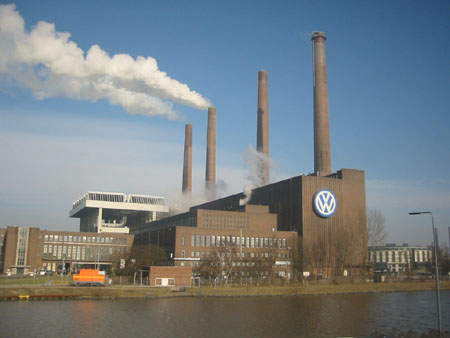by WorldTribune Staff, September 11, 2019
Climate change protests against cars in general and stricter CO2 emission limits imposed by the European Union are pushing Germany’s vital auto industry to the “brink of collapse,” Volkswagen CEO Herbert Diess said.
“The current campaign against individual mobility and thus against conventional cars is reaching existence-threatening proportions,” Diess told Spiegel Online.

The VW chief called out climate activists who seek to force a shift from gas-driven cars to electric ones. The electricity used to run the electric cars, he said, will still come largely from fossil fuels, so where will be the environmental benefit?
“Instead of using petrol or diesel, we’ll basically use coal, even if we’re electrically powered, and in the worst case we’ll use even lignite,” he said. “That drives the idea of electric mobility ad absurdum!”
Germany employs around 830,000 people in motor manufacturing, which is the country’s largest industry.
“Since motor manufacturing is Germany’s biggest industry sector, this effectively means: Auf Wiedersehen to the German economy,” James Delingpole wrote for Breitbart on Sept. 10.
The industry, Delinpole wrote, “faces a perfect storm of disasters: from ever more stringent EU carbon emissions regulations; from U.S. tariffs; from weakening exports to the Chinese market; from Angela Merkel’s ailing coalition government trying to appease Greens with a new comprehensive climate strategy; from lack of consumer interest in all the electric cars it has built but appears unable to sell; from the diesel emissions cheating scam which is finally hitting the courts next month, with VW facing legal action from 400,000 car owners; from Germany’s Energiewende – the replacement of fossil fuels with more expensive renewables; and from environmental campaigners calling for a ‘transport revolution’ which will lead to the phasing out of private cars altogether.”
According to Reuters, reporting on the eve of Frankfurt’s biennial International Auto Show (IAA), which opens on Sept. 12: “You have cars that cost an extra 10,000 euros to build, fleet-emissions targets requiring a certain sales volume and consumers who may or may not want them,” said one PSA executive. [PSA is the French holding group for marques including Peugeot, Citroen, Opel and Vauxhall.] “All the ingredients are there for a powerful explosive.”
The Reuters report noted that, by next year, “CO2 must be cut to 95 grammes per kilometre for 95 percent of cars from the current 120.5g average – a figure that has risen of late as consumers spurn fuel-efficient diesels and embrace SUVs. All new cars in the EU must be compliant in 2021.”
Delingpole noted that “No country in the world has pushed the green agenda harder than Germany. Now, just as it was in the last war – only with a differently couched, more virtue-signalling political agenda – Germany is being destroyed by totalitarian ideology.”
A report by the consulting firm McKinsey notes that, despite much hype, Germany still generates just 35 percent of its electricity from renewables. And if biomass burning, often dirtier than coal, is excluded, wind, water and solar electricity in Germany accounted for just 27 percent of electricity generation in 2018.
But McKinsey issues its strongest warning when it comes to Germany’s increasingly insecure energy supply due to its heavy reliance on intermittent solar and wind. For three days in June of this year, the electricity grid came close to black-outs.
“Only short-term imports from neighboring countries were able to stabilize the grid,” the consultancy notes.
“It would be much, much easier to sympathize with Germany’s plight if it hadn’t spent the last thirty or forty years pushing the green agenda which has caused such damage across the world to those economies foolish enough to fall for the renewable energy/decarbonization scam,” Delingpole wrote.
“The Germans have a word for the way some of us are feeling right now. Schadenfreude.”
Intelligence Brief __________ Replace The Media
